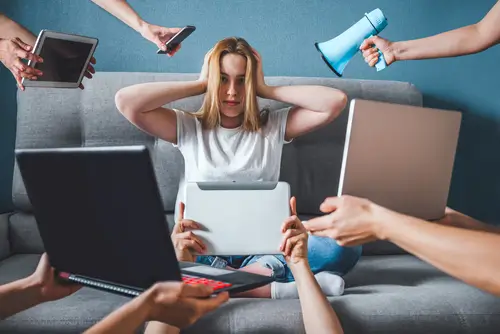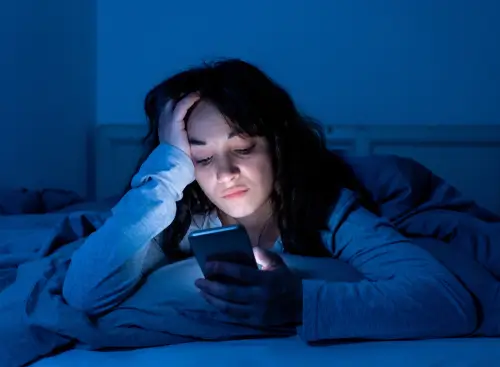There is no doubt that the world we live in today is vastly different than the one we were living in 30 years ago when the internet first became public. Since then, computers, laptops, tablets, smart phones, e-readers, etc. have become the most must-have devices in any household regardless of socioeconomic status.
According to the Pew Research Center, 96% of all Americans own a cell phone as of 2018. Pew also reports that approximately three quarters of Americans also own desktop or laptop computers, while about half own tablets and e-readers. There is absolutely no doubt that America runs on digital devices. But digital devices such as these are not just used for their baseline purposes, rather they are used for much more than that. It is reported that 3.78 billion people are on some type of social media platform like Facebook, Instagram, or Twitter.
Between filtered out news feeds, short, easy-to-watch videos, and memes galore, people are hooked on their devices and the social media apps. Of course, in a time when the majority of the world is facing some level of lockdown/social distancing, staying connected via digital devices feels absolutely critical. But, is it possible that even though everyone else seems to be using digital devices, that you may need a digital detox?

Do I Need a Digital Detox?
A digital detox is just like any other kind of detox. Instead of continuing to use digital devices for a long amount of time, you would instead cut back or eliminate your screen time use for a set period of time. Honestly, living in today’s world without some sort of digital device is nearly impossible, so giving up the use of them permanently is not realistic. But, if you begin noticing certain behaviors tied to your digital use, a detox might just be the thing to help you reboot.
So, what are some of the signs that you might need a digital detox?
You are constantly reaching for your digital device
Constantly reaching for a digital device is especially common in those who utilize their smartphones most frequently, primarily because of the ease of access. You might begin to notice that you continually pick up your phone regularly and without purpose. You might
even notice that you are looking for reasons to use your phone or digital device so that you can go on it. If this is the case, you can benefit greatly from a digital detox, as it can help you break the habitual cycle you are experiencing.

You panic if you can’t find your digital device
Cellphones, tablets, and even laptops can easily be lost at any given moment. In fact, most anyone you ask will tell you that they lost their cell phone or tablet at one point or another. But, it is how you react to losing your digital device that can signify whether you need a detox or not. If you panic or feel like you’ve lost “everything” if you cannot find your digital device of choice, taking a break from using it may be ideal. Our devices absolutely make us feel like we are connected to the world and its ongoings but it is important to feel functional even without them.
Your sleeping habits have become problematic
The use of digital devices has been closely linked to sleep deprivation and for a number of reasons. For example, our bodies are designed to follow a circadian rhythm that allows for us to be wakeful during the day and sleep during the night. But when constantly looking at screens, such as those on a smartphone or tablet, we are disrupting that rhythm but interfering with healthy melatonin production. Melatonin helps us sleep, so when we are confusing the brain by looking at bright lights, we do not get the appropriate levels of melatonin needed to sleep well. A more simple example of how digital devices affect sleep is the constant desire to be online or using a tablet. Ignoring the body’s signals to go to bed when using digital devices can quickly lead to sleep deprivation. If you are noticing that the sleep you are getting is of poor quality, re-examine your digital device use and consider detoxing.

Your mood changes when your using digital devices
There are lots of things on the internet that make us laugh, smile, and get all the feels. But, regular use of digital devices, the internet, and social media platforms especially, can trigger symptoms associated with depression and anxiety. You may notice that your social media use begins to make you feel less-than because someone else might have something you want or is doing something you always dreamed of but can at the moment. Or, you may focus so intently on documenting everything that you are doing that you get anxious about getting pictures, taking videos, etc. Carefully monitor your mood when using digital devices. If you are noticing negative changes as a result of your use, detoxing for a bit can help you rebalance.
In general, if you ever get to a point in your digital use where you begin to question its impact on your health, you can benefit from taking a step back and reconnecting to the things, places, and people around you.
What is Doom Scrolling?
Doom scrolling is a term used to describe the act of endlessly scrolling through negative or upsetting content on social media or news websites, even when it makes one feel anxious, stressed, or hopeless. This type of behavior often involves compulsively consuming negative news or social media posts, leading to a cycle of negative emotions and potentially negative effects on mental health and self-esteem.
It can become a habit for some people, making it difficult to disconnect and engage in more positive or productive activities. The term “doom scrolling” became popular during the COVID-19 pandemic as people were consuming an overwhelming amount of news and social media related to the pandemic.
How Does Digital Detox Work?
During a digital detox, individuals spend less time on their screens and engage in activities like reading, exercising, spending time in nature, practicing mindfulness or meditation, and socializing with friends and family. These activities promote stress reduction, mood improvement, and overall well-being.
Digital detox is about finding a healthy balance and using technology in a mindful way to improve mental health and relationship with technology.

Treatment in California
If you are having a hard time controlling your digital device usage and the behaviors surrounding them, reach out to us right now. We understand how difficult dealing with this issue can be, and we want you to know that we are here to help. We are here to help and support you as you work towards achieving your health goals.





